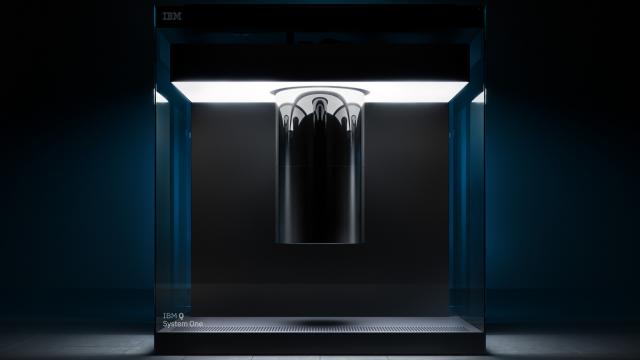IBM has announced the release of Q System One, or as the IBM team described it, “the world’s first fully integrated universal quantum computing system designed for scientific and commercial use.”
The IBM announcement comes with a lot of pictures of a very beautiful-looking case for its quantum processor, just in time for the reports.
Companies often pitch quantum computers as the next frontier in computing — rather than calculating with bits, their quantum bits interact using the same physics behind electrons orbiting atoms. Scientists hope that new quantum processors will simulate physics like never before, or help create new molecules that could cure diseases. Executives hope quantum computers can optimise their businesses, and governments think they might one day become a weapon of cyber warfare, cracking the codes used to encrypt data.
Though they’ve advanced beyond theory papers and labs, quantum computers still can’t do much, and we frequently compare present-day devices to the vacuum-tube era of regular computers. Qubits’ quantum states succumb easily to outside disturbances, turning them into regular bits. The small, imprecise quantum computers of today have yet to find a real “killer app,” and practical applications could be one to several decades away. But I like writing about them, because they’re cool.
The new IBM device uses IBM’s 20-qubit chip, and looks super snazzy, integrating all of the components into one computer so it’s “designed for commercial use.” That implies that someone could potentially one day buy one of their own, but even this new device can only be accessed via the cloud. No word yet on what it might cost. I’ll note that IBM already offers cloud-based access to its Q experience, which includes the 20-qubit chip.
Quantum scientists I asked about the new device were sceptical of how useful it would really be.
“I think it’s definitely significant that quantum computers are becoming more accessible, to the point that you can buy your own integrated system that will let you explore the possibilities of quantum computers,” Andrew Childs, co-director of the Joint Center for Quantum Information and Computer Science (QuICS) at the University of Maryland, told Gizmodo. “Ultimately though, I think figuring out how to make a lot of low-noise qubits is a lot more important than figuring out how to put them in a beautiful package.”
Christopher Monroe, another University of Maryland physicist and founder of quantum computing company IonQ, pointed out the importance of IBM’s cloud products for providing access to small quantum computers. He was disappointed that the announcement didn’t come with details about the computer’s performance.
Others, like Helmut Katzgraber, principle researcher at Microsoft Quantum, thought it a “historical milestone to be able to commercially acquire a digital device, even though the technology is at its infancy.” But he didn’t think that this system would be of much use beyond research and PR.
To be fair, national labs like Los Alamos and companies like Lockheed Martin have purchased D-Wave quantum computers for research purposes in order to benchmark and test their capabilities. The new Q System One employs advances that make it more suited to use in settings like these.
But no, despite IBM’s flashy announcement, we’re not any closer to having a broadly useful, error-corrected quantum computer.
